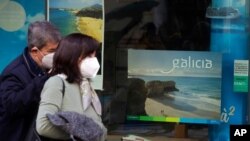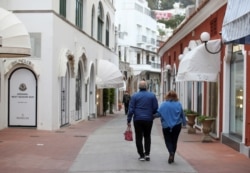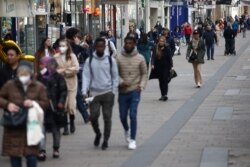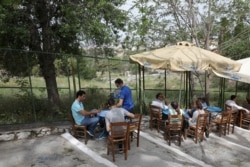Italy is "ready to welcome back the world," Prime Minister Mario Draghi said this week, confirming government plans to launch a COVID passport scheme by mid-month for tourists and other international travelers, allowing them to enter the country without quarantining.
But officials are short on the scheme's details — although tourism minister Massimo Garavaglia said Wednesday it will be "valid for everyone, also and above all for tourists from outside the EU."
"All you need is a simple piece of paper certifying that you respect the rules," and proof that either "you're vaccinated, you're immune because you've had the disease, or you have had a negative test," he told news channel Sky TG24. But exactly who certifies the vaccination remains unclear.
Across tourism-dependent southern Europe, governments and businesses are desperate to welcome back tourists, hoping that a lucrative northern hemisphere summer can save restaurants and hotels from bankruptcy. Tourism accounted for 13% of Italy's GDP before the coronavirus pandemic struck.
But politicians, analysts and the continent's travel industry worry that health passes, which could be printed or stored digitally on a smartphone app, for the vaccinated and for those who have recovered from COVID-19 will end up being confusing.
With agreement between the EU's member states still elusive on a bloc-wide digital scheme, the risk is that travelers will end up having to navigate a mishmash of different credentials offered by the various member states. Technical issues, including how to knit together national databases, to largely political and privacy objections, is undermining the EU ambition of having a pass accepted by all member states, and the scheme risks being as shambolic as the bloc's vaccine rollout, analysts fear.
Last week, the European Commission said countries should open their borders to vaccinated non-EU travelers, although it accepted that each individual member state would decide what works best for them. The EU parliament has also given approval for a bloc-wide scheme for COVID-19 passports, which were originally dubbed, confusingly, "Digital Green Certificates."
Uneven approach
Some countries, including France, Denmark and Austria, are already going their own way and have announced, or are trailing, tentative schemes to allow for domestic travel or for customers to visit hair salons, restaurants and public venues. Denmark's COVID-19 vaccine passport scheme is designed for use by its vaccinated citizens so they can use them to travel restriction-free to other countries that ask for them.
Officials say all of these domestic passes could be repurposed for foreign travelers and could be aligned with a bloc-wide scheme if and when one is agreed and functional.
The Spanish government has announced foreign tourists will be welcome from June 9, if they hold a health pass. But many countries with stubbornly high infection rates and slower vaccine rollouts remain anxious about announcing definite dates for a relaxation of travel restrictions.
Also, large, possibly insurmountable technical questions remain — both for domestic passes as well as for a bloc-wide digital passport. For the EU scheme, who will authorize the pass — a doctor, pharmacy or health center where the vaccine was administered? How will different national apps and databases communicate with each other? The European Commission has issued a request for developers to offer solutions for a centralized digital system.
And how will non-EU travelers, who have been vaccinated in their own countries, be able to tie into the system and have their vaccinations confirmed to the satisfaction of EU authorities? EU officials say shaping a workable framework for the recognition of non-EU inoculation certificates is especially fraught.
EU and U.S. officials have been in discussions about mutual recognition of vaccination certificates, but so far the Biden administration has been loath to contemplate a federal scheme, preferring to leave vaccine passports to the private sector or individual states.
Greece — where a quarter of the country's people earn their income from tourism — along with Iceland and Croatia have already started opening up for fully vaccinated travelers from the U.S., Britain, Israel and EU member states to visit without having to quarantine. Foreign visitors to Croatia can register their inoculations online and receive a Croatian document in return.
Risks
EU Justice Commissioner Didier Reynders has warned of the possibility of "fragmentation across Europe" if an agreement remains elusive. "We would risk having a variety of documents that cannot be read and verified in other member states. And we risk the spread of forged documents, and with it, the spread of both the virus and the mistrust of citizens," he said recently.
Some European lawmakers worry that the non-vaccinated may face discrimination. Ireland's Taoiseach Micheál Martin has also expressed concerns about the continent being divided along a fault line of vaccinated haves and unvaccinated have-nots, limiting the freedom of people who have not yet received a vaccine.
Estonia is working with the World Health Organization on a project to create standardized electronic vaccination certification the country hopes could become the "gold standard" and attract global recognition. But the WHO itself has voiced worries about vaccine passports, fearing those who have been inoculated could still spread the virus.
There also are disagreements over what rules should apply to travelers who received vaccines not approved by the European Medicines Agency, the EU entity that evaluates and monitors medications. Hungarian officials reacted angrily this month to the European Parliament's decision to withhold automatic authorization of vaccines not approved by the EMA. Many Hungarians have been inoculated with non-EU approved vaccines.
Hungarian official Gergely Gulyás said recently countries should accept one another's vaccine certificates based on reciprocity, and that if they refuse, "then on the basis of reciprocity Hungary will not accept the certificates of countries which do not accept those of Hungary."







